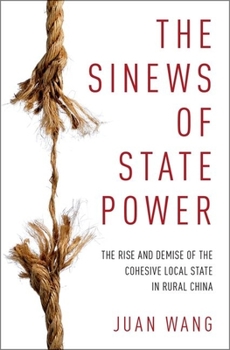Sinews of State Power: The Rise and Demise of the Cohesive Local State in Rural China
The Sinews of State Power seeks to explain why rural China has been so unstable since 2000, despite numerous national reforms. Using original fieldwork, it traces the rise and demise of cohesive local states in rural China since the Maoist era. It shows that, the county, township, and village levels of government, when in alliance, have facilitated economic growth and caused social grievances. However, national reforms redressing local deviation, together with individual responses from each level of administration, have dismantled elite alliances, and consequentially undermined the extractive, coercive, and responsive capacity of the state. This book forms dialogue with two fields of inquiry in China studies and comparative politics. First, researches on farmer protest often either focus on farmers' grievances, organizations, and strategies, or examine responses from the state as a uniform entity. This book, instead, highlights the anthropology of the state by looking into elite cohesion across administrative levels that determines the exercise of state capacity. Second, studies of regime stability or endurance have stressed holistic factors, such as institutional adaptability, political culture, or epidemic corruption. The Sinews of State Power instead revisits the fundamental components of a capable government - a coherent and robust local leadership that enables the function of a state.
Format:Hardcover
Language:English
ISBN:0190605731
ISBN13:9780190605735
Release Date:April 2017
Publisher:Oxford Univ PR
Length:256 Pages
Weight:1.10 lbs.
Dimensions:1.0" x 6.3" x 9.4"
Customer Reviews
0 rating





